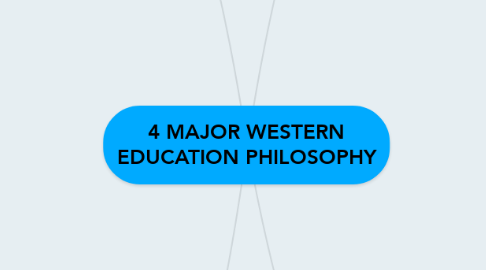
1. EXISTENTIALISM
1.1. AIMS OF EDUCATION:
1.1.1. -Help students understand and appreciate themselves as unique individuals
1.1.2. -Educate the whole person
1.1.3. -To help the learner become fully his authentic self
1.2. THE PEDAGOGY USED:
1.2.1. -Focus is on the individual
1.2.2. -Values education is a matter of choice that goes throughout existence
1.2.3. -Critism to any individual work is less important
1.3. THE CURRICULUM:
1.3.1. -Self-paced and self-directed
1.3.2. -Students are given options
1.3.3. -Composed of fine arts, drama, creative expression, literature and philosophy
1.4. THE ROLE OF TEACHER:
1.4.1. -Help students define their own essence
1.4.2. -To relates with each student openly and honestly
1.4.3. -Create an environment in which they freely choose their own preffered way
1.4.4. -Questioner
1.4.5. -Poser of alternatives
1.5. PROPONENT:
1.5.1. -Soren Kiekergaard
1.5.2. -Martin Heidegger
1.5.3. -Albert Camus
1.5.4. -Jean-Paul Sartre
1.6. NATURE OF THE PARTICULAR PHILOSOPHY:
1.7. THE SUBJECTS:
1.7.1. *They can freely choose what subject they want to study as long as they are interested in it*
1.8. THE ROLE OF STUDENTS:
1.8.1. -To define their own essence/meaning of life
1.9. TEACHER CENTERED
2. ESSENTIALISM
2.1. AIM OF EDUCATION:
2.1.1. -The primary function of the school to be the preservation and transmission of the basic elements of human culture
2.2. THE PEDAGOGY USED:
2.2.1. -Deductive method
2.2.2. -Recitation
2.2.3. -Assignments
2.2.4. -Analysis and synthesis
2.3. THE CURRICULUM:
2.3.1. -Core skills (reading and writing)
2.3.2. -Hard science, technical and vocational couses
2.3.3. -Arts
2.3.4. -Values of discipline, hard work
2.4. THE ROLE OF TEACHER:
2.4.1. -The leader of the classroom
2.4.2. -To keep order in the classroom
2.4.3. -Control the students with distributions of rewards and penalties
2.4.4. -Must interpret essentials of the learning process
2.5. PROPONENT:
2.5.1. -William Bagley
2.5.2. -H. G. Rickover (1959)
2.5.3. Paul Copperman (1978)
2.6. NATURE OF THE PARTICULAR PHILOSOPHY:
2.7. THE SUBJECTS:
2.7.1. -Foreign Language
2.7.2. -Natural Science
2.7.3. -History
2.7.4. -Literature
2.7.5. -Math
2.8. THE ROLE OF STUDENTS:
2.8.1. -Learn passively
2.8.2. -Learn morals, values and manners
2.8.3. -Not free to explore, question and test material
2.9. TEACHER CENTERED
3. IDEALISM
3.1. AIM OF EDUCATION:
3.1.1. -Search for truth
3.1.2. -Self-realization
3.1.3. -Character development
3.2. THE PEDADOGY USED:
3.2.1. -Intuitive approach
3.2.2. -Lecture method
3.2.3. -Projects, supplemental activities, library research
3.2.4. -Self-directed activity
3.3. THE CURRICULUM:
3.3.1. -Mathematic
3.3.2. -History
3.3.3. -Science
3.3.4. -Literature
3.3.5. -Technology
3.3.6. -Languages
3.4. THE ROLE OF TEACHER:
3.4.1. -Assist students in choosing important material
3.4.2. -Encourage students ask questions
3.4.3. -Socratic characteristic
3.5. NATURE OF THE PARTICULAR PHILOSOPHY:
3.6. PROPONENT:
3.6.1. -Plato
3.7. THE SUBJECTS:
3.7.1. -Math and Physics
3.7.2. -Biology
3.7.3. -Literature and Art
3.7.4. -Grammar
3.7.5. -History
3.8. THE ROLE OF STUDENTS:
3.8.1. -A student must obey his or her teacher
3.8.2. -They must respect their teacher
3.9. TEACHER CENTERED
4. REALISM
4.1. AIM OF EDUCATION:
4.1.1. -Put great emphasis on the practical side of education (education for moral and character development)
4.2. THE PEDADOGY USED:
4.2.1. -Understanding of facts and ways of ordering
4.2.2. -Emphasis on critical reason aided by observation and experimentation
4.3. THE CURRICULUM:
4.3.1. -Practical studies such as writing and reading, introduce and extensive use of pictures in the educational process
4.4. THE ROLE OF TEACHER:
4.4.1. -Present material in a systematic and organized way
4.4.2. -Return to more basic subject matter
4.5. PROPONENT:
4.5.1. -Aristotle
4.6. NATURE OF THE PARTICULAR PHILOSOPHY:
4.7. THE SUBJECTS:
4.7.1. -Chemistry
4.7.2. -Biology
4.7.3. -Astrology
4.7.4. -Music
4.7.5. -Physics
4.8. THE ROLE OF STUDENTS:
4.8.1. *Free to decide their own activities*
